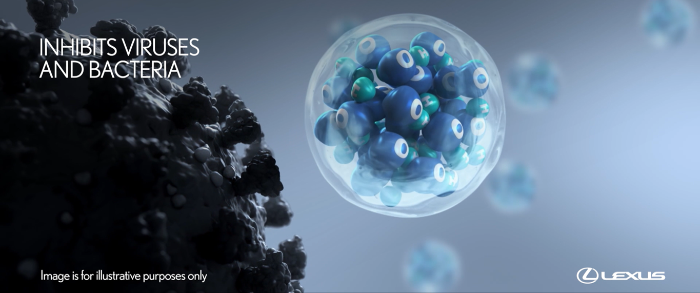Lexus rolls out next generation nanoe™ X[1] system across all line-ups; a technology created by Panasonic.
Nano-sized water particle diffusion technology creates a cleaner, healthier in-car environment Inhibits viruses, bacteria, pollen, mold and reduces odors.

Stops moisture evaporation, leading to smooth, well-hydrated skin.
New nanoe X delivers increased reactive components with 10-fold compared to the previous version.
When it comes to air quality, Lexus isn’t just concerned about the emissions produced by vehicles, it is taking care to ensure the atmosphere inside its cars is kept as pure as possible. To maintain a clean and healthy cabin environment and protect the well-being of everyone on board it is introducing nanoe next generation: nanoe X. This technology, created by Panasonic, is invisible to the human eye but is effective in suppressing potentially harmful and unpleasant particles.
The scientific principle is simple: water molecules are discharged into the airflow containing microscopic hydroxyl radicals. These can inhibit viruses, bacteria, pollen and other allergens and can act against the spread of mould. They can also deodorize bad Oduors and stops moisture evaporation, leading to hydrated skin and hair.
The new generation nanoe X technology was first introduced in the Lexus ES executive saloon in 2021. It is now also available on the new UX, the new generation RX and the all-new RZ as part of the Lexus Climate Concierge system. Other models will follow in 2023.
The effectiveness of nanoe X has been independently tested by organizations and academic bodies worldwide[2]. For example, laboratory research has shown that in one hour, it can inhibit more than 99% of viruses and bacteria; achieve a 1.8 reduction in Oduors intensityThe new nanoe X technology is a major development of the original nanoe technology previously used in Lexus vehicles. A much greater effect has been achieved thanks to a 10-fold increase in the number of hydroxyl radical particles that are emitted – from 480 billion per second to 4.8 trillion.
Abundant in nature, hydroxyl radicals are now being used to improve air quality in enclosed areas such as vehicles, places of work and public spaces. Once released, they react with elements in the atmosphere. This is a naturally occurring process that allows them to inhibit the growth of pollutants, breaking them down and neutralising their adverse effects. These include hazardous substances contained in PM2.5 particulates.
The benefits of this advanced air purification technology can be enjoyed on every car journey but are of particular value when driving in heavily polluted urban areas. Its rewards will also be appreciated when different passengers are carried day-to-day. This can include private hire vehicles, business fleets with multiple users and cars used to ferry groups of children to and from school.


COMMENTS